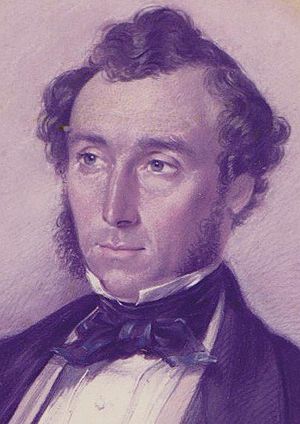William Schaw Lindsay facts for kids
Quick facts for kids
W.S. Lindsay
|
|
|---|---|

Lindsay c1855.
|
|
| Born |
William Schaw Lindsay
19 December 1815 Ayr, Scotland
|
| Died | 28 August 1877 (aged 61) Shepperton, Middlesex, England
|
| Education | Ayr Academy |
| Occupation | Mariner, shipowner, Member of Parliament and author |
| Years active | 1834–1877 |
| Spouse(s) | Helen Stewart (1843–1877) |
| Children | William Stewart Lindsay |
| Parent(s) | Joseph Lindsay Mary Belch |
William Schaw Lindsay (born December 19, 1815 – died August 28, 1877) was a successful British businessman. He owned many ships and was also a politician. He served as a Member of Parliament (MP) for two different areas in England: Tynemouth and North Shields from 1854 to 1859, and Sunderland from 1859 until 1864. He had to stop working due to poor health.
Contents
A Life at Sea and in Politics
Early Years and Sea Adventures
William Schaw Lindsay was born in Ayr, Scotland, on December 19, 1815. He grew up with his uncle, Reverend William Schaw, because he lost both his parents by age ten. His uncle wanted him to become a minister, but William had other plans.
In 1831, at just 15, he left home. He worked his way to Liverpool by shoveling coal on a "collier" ship, which carried coal. Soon after, he became a cabin-boy on the Isabella, a ship that sailed to the West Indies.
By 1834, he was a second mate. This meant he was an officer on the ship. Sadly, he was badly hurt in a shipwreck. After he recovered in 1835, he became the chief mate on the Olive Branch. This was a merchant ship owned by Mr. Greenwell of Sunderland.
In 1836, William became the captain of the Olive Branch. In 1839, while sailing in the Persian Gulf, he was injured during a fight with pirates. He decided to stop working at sea in 1840.
Becoming a Business Leader
After leaving the sea, Lindsay started working for Mr. Greenwell again in 1841. He became an agent for a coal company in Hartlepool. He helped Hartlepool become an important independent port. He also helped build its docks, which are places where ships load and unload goods.
In 1845, he moved to London to represent the company there. He also started his own business, W. S. Lindsay & Co. This company became one of the biggest ship-owning businesses in the world. He stayed connected to it until he retired in 1864 because of his health.
In 1852, Lindsay ordered a new ship called the W. S. Lindsay. It weighed 900 tons and was the largest iron ship built at that time. It was designed to carry people moving to Australia. Even though it cost more, it was very efficient. On its first trip, with 300 passengers, the ship tilted over in a storm. It had to be pulled back to London for repairs.
A Career in Parliament
William Lindsay tried to become a Member of Parliament (MP) in 1852 but didn't win. However, in March 1854, he was elected as the MP for Tynemouth and North Shields. An MP is a person elected to represent their area in the country's government.
He continued to represent Tynemouth until 1859. He supported changing the "navigation laws," which were rules about shipping. This made some people unhappy, and he withdrew from the election. But he was then elected as the MP for Sunderland.
In 1859, people in Tynemouth gave him a special gift. It was a cabinet filled with books by famous writers like William Shakespeare. They thanked him for helping their town and for supporting education.
During the American Civil War (1861–1865), Lindsay spoke in the British Parliament. He supported the Southern states (the Confederacy) in their fight. His letters about this topic are now kept in a library in the United States.
In 1865, he had to retire from public life because he was very ill. While he was an MP, he worked hard to help both the navy and commercial shipping. He also helped create a group that wanted to improve how the government was run.
William Schaw Lindsay passed away at Shepperton Manor, Middlesex, on August 28, 1877.
Family Life
On November 14, 1843, William married Helen Stewart. Helen's brother, Robert Stewart, was an "ironmaster," meaning he owned a business that made iron. William also traded in Robert's "pig iron," which is a type of raw iron.
William and Helen had a son named William Stewart Lindsay. He was born in London in 1849 and later moved to New Zealand, where he passed away in 1924.
Books and Writings
After he retired, Lindsay spent his time writing. He wanted to make shipping laws better, not just in England, but also in countries like France and the United States. He believed in "free trade" for ships, meaning fewer rules and taxes on shipping.
His most important book was called History of Merchant Shipping and Ancient Commerce. It was a huge, four-volume set published between 1874 and 1876. It was a complete guide to the history of shipping.
He also wrote other books and articles, including:
- Letters on the Navigation Laws (1849)
- Our Navigation and Mercantile Marine Laws (1852)
- Remarks on the Law of Partnership and Limited Liability (1856)
- Our Merchant Shipping: its present state considered (1860)
- Manning the Royal Navy and Mercantile Marine (1877)
Lindsay also wrote about his own experiences at sea in books like Log of my Leisure Hours and Recollections of a Sailor. Sadly, he didn't finish the second one before he died.
See also
- Shipbroking
- Coaling (ships)
- Panic of 1847
- Navigation Acts#Repeal

